Knocked out by the Grim Reaper
by Sachi Sri Kantha, February 10, 2023
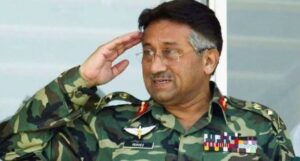
Gen. Pervez Musharraf
After evading more than four assassination attempts during his term of office as the President- strong man of Pakistan (2000-2008), Gen. Pervez Musharraf (1943-2023) was eventually knocked out by the Grim Reaper on February 4th. The cause of his death is attributed to suffering from amyloidosis. I have no hesitation in placing this unscrupulous, slimy, chameleonic rascal of a politician as the foremost adversary of Eelam state, among the non-Sri Lankans.
Involvement in the Eelam war
Musharraf was the prominent weapon supplier to the Sri Lankan army, for almost 8 years, in the Eelam War III and IV period. I’ll not be wrong in asserting that despite the bragging of the Sinhala nationalists, LTTE lost the war in 2009, mainly due to the New Delhi-born Musharraf’s contribution to the war (as weapon supplier and military trainer) and NOT to the brilliance of Sinhalese generals. The equation was like this. Between 2001 and 2008, from Uncle Sam (under President Bush Jr.), Musharraf was receiving a billion dollar per year in weapon supply to fight it’s war on Al – Quaida terrorism in Afghanistan. To rattle India’s hands in Sri Lanka, Musharraf passed off more than a million dollar per year of this weapon supply to the Sri Lankan army.
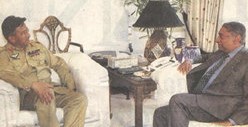
Musharraf with Lakshman Kadirgamar, March 2001
During 2000 and 2001, when the Sri Lankan army was struggling against the LTTE’s spirited attack in the battle fields of Northern province, it was Musharraf’s military supply that saved the humiliation faced by the Sri Lankan army. So much to an extent that retired military chief of Sri Lankan army Lieut Gen C.S. Weerasooriya was posted as the ambassador of Sri Lanka to Pakistan in September 2000 immediately, by the then President Chandrika Kumaratunga. To soothe the rattled Sinhala media in Colombo about the poor performance of the Sri Lankan army, Musharraf played a hero role to the extent that he was extolled as ‘A friend in need; a friend indeed’.
By disregarding the time sequence as well as the historical – political realities, Musharraf projected himself as an ignoramus and pouted nonsense such as, “You cannot equalise the struggle in Kashmir with that of the LTTE. There is no similarity at all. In Kashmir you find a clear dispute within the region, whereas the situation in Sri Lanka is quite different, which is purely an internal conflict: The Kashmir issue is before international fora such as the United Nations and also it has been identified by the international community, but the LTTE has no such international recognition. Even India supported the Sri Lankan military by sending troops where hundreds of Indian soldiers lost their lives on Lankan soil. We did not go to that extent, but why cannot we support Sri Lanka, another brother nation.”
While visiting Colombo in August 2002, as a press briefing held at the Colombo Hilton Hotel, Musharraf had stated, “the two countries (i.e, Pakistan and Sri Lanka) had a healthy defence cooperation and that this will be continued. Over 2,000 Sri Lankan military personnel had received training in Pakistan and this would continue. Military armaments manufactured in Pakistan too will continue to be made available to Sri Lanka.” In the same press meeting, Musharraf had also said “as a military man he wanted to pay a glowing tribute to the Sri Lankan armed forces. I praise the Sri Lankan armed forces for sustaining their effort for 20 long years. Full credit should go to them.” While others may take this at it’s face value, I take this as a back handed compliment to Prabhakaran’s LTTE army, who had fought the Eelam war valiantly, despite all the odds against them. Over 2,000 Sri Lankan military personnel trained in Pakistan as well as millions of dollars of weapons from Pakistan given by Musharraf (which he had siphoned off from Uncle Sam’s supply after September 11, 2001) to the Sri Lankan army couldn’t bring the expected success immediately.
Editorial of Dawn paper
I provide below verbatim, the editorial in the Dawn (Karachi) newspaper of Feb. 6, 2023.
“Following in the footsteps of military strongmen Ayub and Zia, Pervez Musharraf, the ‘saviour general’ who directly ruled Pakistan, will be remembered for bringing the democratic process in the country to an abrupt halt. He served as ‘chief executive’ after the 1999 coup, then as military, and finally civilian, president before stepping down in 2008 as the sword of impeachment hovered over his head.
Musharraf violated the Constitution twice, earning the dubious distinction of being Pakistan’s only military ruler to be sentenced to death for high treason for imposing his second emergency in 2007. He was something of an enigma as his authoritarian rule was also interspersed with liberal reforms.
The Musharraf saga began on a note of high drama, as his flight from Sri Lanka was initially not allowed to land in Karachi. Subsequent events changed the course of Pakistan’s history. The army leadership staged a coup to remove the elected prime minister Nawaz Sharif and the latter was sentenced on charges of hijacking and terrorism.
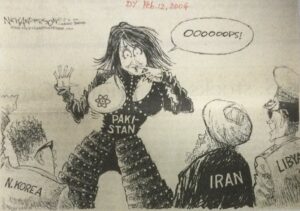
Musharraf cartoon Feb.12,2004
Thanks to Saudi intervention, Mr Sharif and his family spent the next several years in exile in the kingdom, as Gen Musharraf became the master of all he surveyed. Some liberal sections had welcomed the coup out of concern at Mr Shariff’s increasingly conservative inclinations. But the general was in no hurry to leave, and appeared intent on leaving his ‘mark’. The events of 9/11 brought this region into the global spotlight once again, with the West more than happy to work with the general to achieve their goals in Afghanistan.
He created an atmosphere of liberalism in the country and started the process of accountability, though the latter proved to be controversial exercise. He restored the joint electorate, gave a relatively workable LG system and liberalized the media ecosystem, but cracked down on the press during his second emergency. Despite his reputation as the man responsible for the Kargil debacle, he advocated for peace with India, helping to bring Pakistan and India the closest to a settlement on the Kashmir issue they had ever been.
Yet the late general’s mistakes were considerable, the biggest and most unforgivable being the derailing of the constitutional order. In order to survive politically, Musharraf formed questionable alliances with the PML-Q in Punjab and MQM in Sindh. Under him, the situation in Balochistan worsened – and is yet to normalize – after the killing of Akbar Bugti in 2006.
The transition from Gen Musharraf to Mr Musharraf was an unremarkable one as his All Pakistan League suffered the fate of most other one-man parties, slipping into oblivion after 15 minutes of fame. The Musharraf era holds numerous lessons for Pakistan’s ruling elite, civilian and military. All can learn from his many mistakes, as well as his successes.”
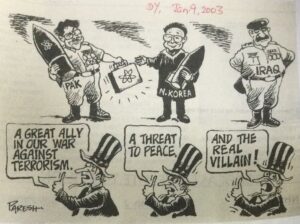
Musharraf cartoon Jan.9, 2003
This appraisal of Musharraf’s limited successes and ‘considerable mistakes’ is too kind for this chameleonic rascal. Even the first sentence of the editorial omitted the name of another Pakistani general Yahya Khan, who precipitated the Indo-Pakistan war of 1971, that resulted in the birth of Bangladesh. Other two serious omissions are the following: (1) bilking Uncle Sam’s treasury for nearly 10 billion dollars (at a rate of a billion per year – mostly military aid), under the pretext of fighting Al Quaida terrorism, while having the chutzpah to hide Osama bin Laden in Pakistan, within military surveillance range. That Musharraf ‘s knowledge about the presence of Osama bin Laden in Pakistan can scarcely be disputed. But, after the killing of Osama bin Laden on May 1, 2011, while visiting Washington DC, Musharraf told a bold face lie, ‘I confidently and surely say that there was not complicity because I am very sure of one thing: that I didn’t know, whether one believes it or not.’ In July 2011. (2) allowing Abdul Qadeer Khan’s nuclear arsenal delivery to Uncle Sam’s designated ‘pariah nations’ (North Korea, Libya and Iran) via Sri Lankan middleman businessman B.S.A. Thahir.
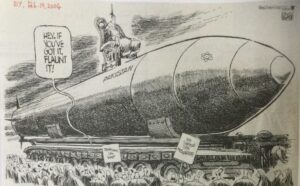
Musharraf cartoon Feb.19, 2004
Political Cartoons on Musharraf
As per the above mentioned nuclear arsenal delivery by Pakistan’s agents, I had collected three political cartoons in my files, that featured Pervez Musharraf. These are provided nearby for visual enhancement of this obit note of scoundrel Musharraf. Nick Anderson’s cartoon in 2004, was a humorous take on the notorious breast exposure event of singer Janet Jackson during the 2004 Super Ball show, tagged in the media as ‘wardrobe malfunction’ – Musharraf the woman dancer, dangling his breasts (labelled with nuclear symbols), in front of her customers N. Korea, Iran and Libya. Paresh’s cartoon of Musharaff passing the nuclear secrets suitcase to N. Korea, ridicules the gullibility of Uncle Sam (President George Bush Jr.) who touts him as ‘A great ally in our war against terrorism’. The cartoon of Don Wright of Palm Beach Post, also focused on the same team, with Musharraf wearing military uniform sitting in a chair atop a nuclear missile, while one in the gathered audience quipping ‘Hey, if you’ve got it, flaunt it!’ The fourth cartoon by Indian cartoonist Keshav Venkataraghavan shows Musharraf sitting in a durbar style cushion with a tag ‘Major Non-NATO ally’ and having a check list scribbled F-16s, Arms, etc., while Gen Colin Powell (then the Secretary of State for President Bush Jr.’s presidency) bowing and handing a sword, stating ‘Just outsourcing the war on terror’. I appreciated the contrasts between the positions held by two military generals. Gen. Powell had an impressive record in the American army, compared to Gen. Musharraf. But, in politics, Musharraf ranked higher to be seated, while Powell was shown as standing and paying obeisance.
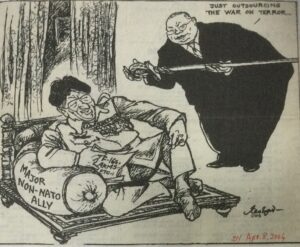
Musharraf cartoon April 8, 2004
Musharraf’s post presidency record
Musharraf launched a political party – All Pakistan Muslim League (APML), at the National Liberal Club while he was living in London in 2010. The reason he mentioned for the launch of his party in London was that he risked assassination if he returned to Pakistan. This party vanished in thin air, after receiving a severe drubbing 2013 elections – only 0.12% of votes polled. In August 2017, an anti-terrorism court (ATC) in Rawalpindi while announcing the verdict in Benazir Bhutto murder case, indicted Musharraf as an absconder. Musharraf received death sentence on December 17, 2019 for suspending the Constitution on November 3, 2007 and imposing emergency.
Sources
Anon: Pakistan with Lanka all the way – Musharraf. The Island (Colombo), Aug 2, 2002. http://www.island.lk/2002/08/02/news03.html
BBC News: ‘Sorry’ Pervez Musharraf launches new Pakistan party. Oct 1, 2010.
https://www.bbc.com/news/world-south-asia-11450507
Alan Cowell and Stephen Kinzer: Pervez Musharraf, former military ruler of Pakistan, dies at 79. New York Times, Feb. 5, 2023.
Adnan Rehmat: If India can’t Pakistan might. Himal magazine, Sept 1, 2000.
https://www.himalmag.com/if-india-cant-pakistan-mightpakistan-india-sri-lanka/
Reuter: Musharraf says Pakistan not complicit on bin Laden. July 22, 2011
https://jp.reuters.com/article/idINIndia-58386220110721
Sudha Ramachandran: The Pakistani muscle behind Colombo. Asia Times, Sept 22, 2006. https://web.archive.org/web/20061019075144/http://www.atimes.com/atimes/South_Asia/HI22Df01.html (accessed Feb 10, 2023).
Bruce Riedel. Pakistan’s Musharraf accused of knowing Osama bin Laden’s hideout. Feb 14, 2012. https://www.brookings.edu/opinions/pakistans-musharraf-accused-of-knowing-osama-bin-ladens-hideout/